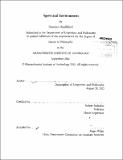Agent and environment
Author(s)
Rochford, Damien (Damien Joseph)
DownloadFull printable version (3.447Mb)
Other Contributors
Massachusetts Institute of Technology. Department of Linguistics and Philosophy.
Advisor
Robert Stalnaker.
Terms of use
Metadata
Show full item recordAbstract
This paper is about how agents learn. There is a picture of learning that is very influential in epistemology; I call it 'the Classical Picture'. As influential as it is, it is a flawed picture of learning, and epistemology is distorted by it. In this paper, I offer an alternative: the Calibration Picture. It is based on an extended analogy between agents and measuring devices. Epistemology looks very different from the Calibration point of view. Distinctions that are absolute, given the Classical Picture, are relative, given the Calibration Picture. These include the distinction between enabling and justifying roles of experience, the distinction between a priori and a posteriori knowledge, and the distinction between irrationality and ignorance. The beautiful thing about the Calibration Picture is that it gives you a precise way to characterise what is absolute, and a precise way to recover Classical distinctions from that absolute thing, relative to a context. In this way, the Calibration Picture enables you to recover much of the power of the Classical Picture, while offering a new way to understand its significance.
Description
Thesis (Ph. D.)--Massachusetts Institute of Technology, Dept. of Linguistics and Philosophy, 2013. Cataloged from PDF version of thesis. Includes bibliographical references (pages 65-67).
Date issued
2013Department
Massachusetts Institute of Technology. Department of Linguistics and PhilosophyPublisher
Massachusetts Institute of Technology
Keywords
Linguistics and Philosophy.